
The Strategic Relevance and Distinctive Nature of Labor Due Diligence in M&A Transactions
Labor Due Diligence constitutes a critical stage within the broader scope of legal and compliance assessments conducted in corporate Mergers and Acquisitions (M&A). It entails a systematic examination of the target company’s employment practices, labor liabilities, and overall compliance with labor and social security legislation, aiming to produce a legal risk mapping that informs transaction structure, pricing, indemnity clauses, and post-closing contingencies.
While the due diligence process is typically conducted under strict confidentiality with respect to third parties, it is simultaneously governed by the principle of full disclosure between the contracting parties, ensuring transparency and mitigating the risk of hidden or undisclosed liabilities (undisclosed contingencies).
The purpose of labor due diligence is to provide both the seller and the buyer with a robust evidentiary basis to assess legal exposure and make informed, risk-adjusted decisions. Labor matters, however, demand a tailored approach due to the evidentiary dynamics and normative peculiarities of Brazilian Labor Law, particularly in light of the principle of primacy of reality (princípio da primazia da realidade). According to this principle, in labor litigation, factual reality prevails over the formal content of documents—a divergence from the civil law paradigm where written instruments often dominate evidentiary weight.
In practice, this means that even if a company maintains formally compliant documentation—such as employment contracts, time sheets, and pay slips—its legal position may still be undermined by testimonial evidence provided by employees in judicial proceedings. Such testimony may be sufficient to rebut documentary evidence, thereby triggering labor contingencies unforeseen by a purely formalistic review.
This does not render compliance with formal requirements futile. On the contrary, deficient documentation substantially increases litigation risk and evidentiary vulnerability. However, labor compliance must go beyond formal recordkeeping—it requires an effective governance structure in human capital management, operational practices aligned with labor standards, and preventive legal oversight of employment policies.
Therefore, comprehensive labor due diligence in M&A transactions should not be limited to documental review and data room uploads. It must include qualitative methodologies, such as stakeholder interviews, walkthroughs with HR personnel, and on-site assessments, always conducted with strict confidentiality and in coordination with deal strategy.
Moreover, legal practitioners must also assess exposure to administrative proceedings (e.g., labor audits by the Ministério do Trabalho or Receita Federal), structural weaknesses in internal processes (such as payroll or personnel file management), and latent liabilities not yet judicialized. These aspects may significantly impact purchase price adjustments, the negotiation of representations and warranties, and the structuring of indemnity provisions.
Given the complexity and sensitivity of labor exposure, this component of due diligence should be led by counsel with proven expertise in labor and employment law, litigation risk analysis, and transactional advisory, combining academic rigor with pragmatic experience, discretion, and strategic insight.
By Flavia Montoni Pontes

Built to Suit (BTS) Contract
The Built to Suit (BTS) contract is a commercial legal model in which the lessor commits to customizing a property — either by constructing it from scratch or by carrying out renovations — according to the specifications requested by the lessee. It is a tailor-made solution designed to meet specific needs, primarily in business operations.
Among its main features are the customization of the property according to the lessee’s needs, the establishment of a necessarily long term, usually exceeding 10 years, and its exclusive use for commercial purposes. Another notable feature is the freedom of the parties to negotiate and agree upon the contractual clauses, given the atypical nature of the BTS, as well as the possibility of stipulating a waiver of the right to review the rental amount during the term of the contract.
The “Superior Tribunal de Justiça” (STJ), in the judgment of “Recurso Especial nº 1.521.448/SP”, consolidated the understanding of the legal nature of the BTS, recognizing its concept, the validity of freely negotiated clauses, and the parity between the contracting parties. The decision emphasized that the BTS is not subject preferentially or exclusively to the “Lei do Inquilinato” and reaffirmed the principle of party autonomy as the guiding principle for this type of agreement.
Regarding the rental amounts, it is common for the rent established in Built to Suit contracts to be higher than the market average. This is because the lessor initially bears all expenses related to the construction or renovation of the property to meet the lessee’s requirements. Furthermore, the rent also reflects the risk assumed by the lessor. Throughout the contract, the lessee reimburses these expenses in a diluted manner: with each installment paid, the lessee covers not only the use of the property (rental) but also the investment made by the lessor in the improvements. For this reason, the total rental amount is higher than that practiced in ordinary leases.
Although the BTS is an atypical contract, it has express legal support under Article 54-A of the “Lei do Inquilinato” (Lei nº 8.245/91). This provision establishes that, in the non-residential lease of an urban property built or substantially renovated by the lessor to meet the lessee’s needs, the freely negotiated conditions shall prevail, including the possibility of waiving the right to rent review during the contractual term.
Among the advantages for the lessor are maintaining ownership of the property, retaining the improvements made, and receiving rent higher than the market average. For the lessee, the BTS offers a property tailored to their needs, the dilution of adaptation costs into the rent, and favorable accounting treatment.
In summary, the Built to Suit contract is a strategic alternative for lessors and lessees, offering legal security, profitability, and customization in commercial leasing.
By: Raphael Mota Chaves
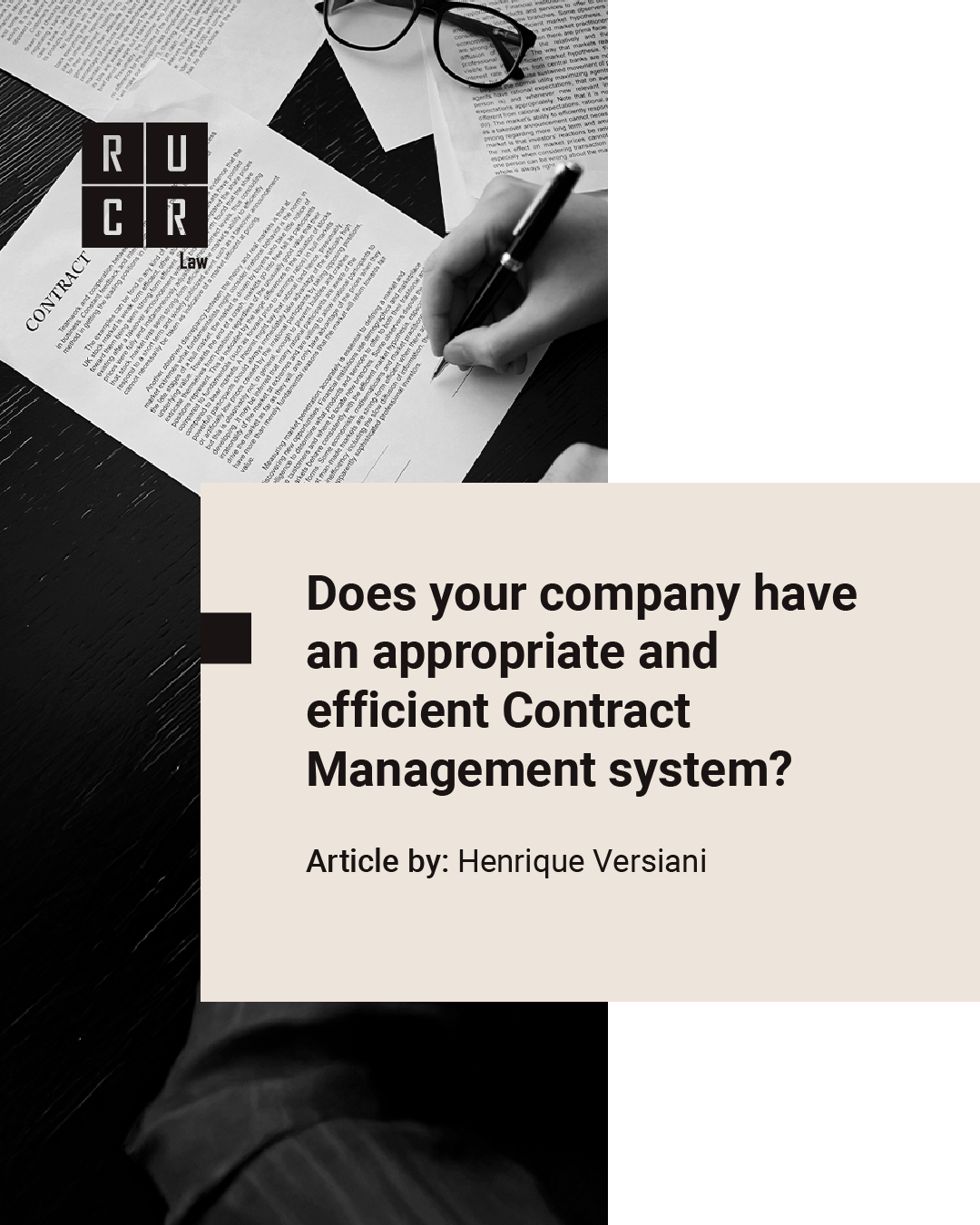
Does your company have an appropriate and efficient Contract Management system?
Contract Management is the process that encompasses a set of techniques, tools, and procedures carried out in favor of organizing all the documentary life of a company. This means organizing all the documents that translate the set of rights and obligations assumed by a company contractually.
Managing a contract involves several stages. It starts with the drafting of its first draft and continues even after its termination, ensuring its proper storage. Other stages of this process include: negotiation between the parties; the signing; the execution of the contract and monitoring of its compliance; and, in many cases, termination – whether due to the scope’s completion, the passage of time, a request from one of the parties, or the emergence of a conflict.
In a corporate environment, the organization of contracts is essential to ensure the safe progress of business, as well as to facilitate decision-making.
What practice shows is that many companies end up struggling with Contract Management. Whether due to a lack of technical experience to agree on contractual clauses – which can create a problem between the parties in the future – or the loss of documents relevant to the company, due to poor organizational storage.
At RUCR Law, we offer the service of outsourcing contractual organization, ensuring the highest legal security in all relationships for our clients.
We have a team of lawyers specialized in Contracts, ready to work on the drafting and review of all types of contracts, as well as on negotiation with the opposing parties. Our team also manages the signings, execution, and storage, using various tools.
We have developed a series of processes and tools that assist in Contract Management. One of our key tools is the Contract Dashboard, a type of spreadsheet housed within our internal system that centralizes the main information of each signed contract. By quickly reviewing the line corresponding to a specific contract, managers can easily and directly obtain all necessary information to decide on a possible termination or renewal of the contract, for example. This saves the technical work of contract analysis and simplifies the decision-making process for company executives.
Moreover, we centralize all contracts on our server in an organized and segmented manner, allowing us to share access with the client. This ensures the security of the storage of signed contracts. There is also a complete control of the contract’s lifecycle, as all contracts that come through the office start with a drafting task, whether it involves writing or revising the draft. This means there will be a permanently recorded task in our internal system that includes all negotiation dealings, including all emails exchanged between the parties, contract versions, and any other relevant information.
This means complete and comprehensive management of contracts and their entire lifespan.
Contact us to learn more about our services.
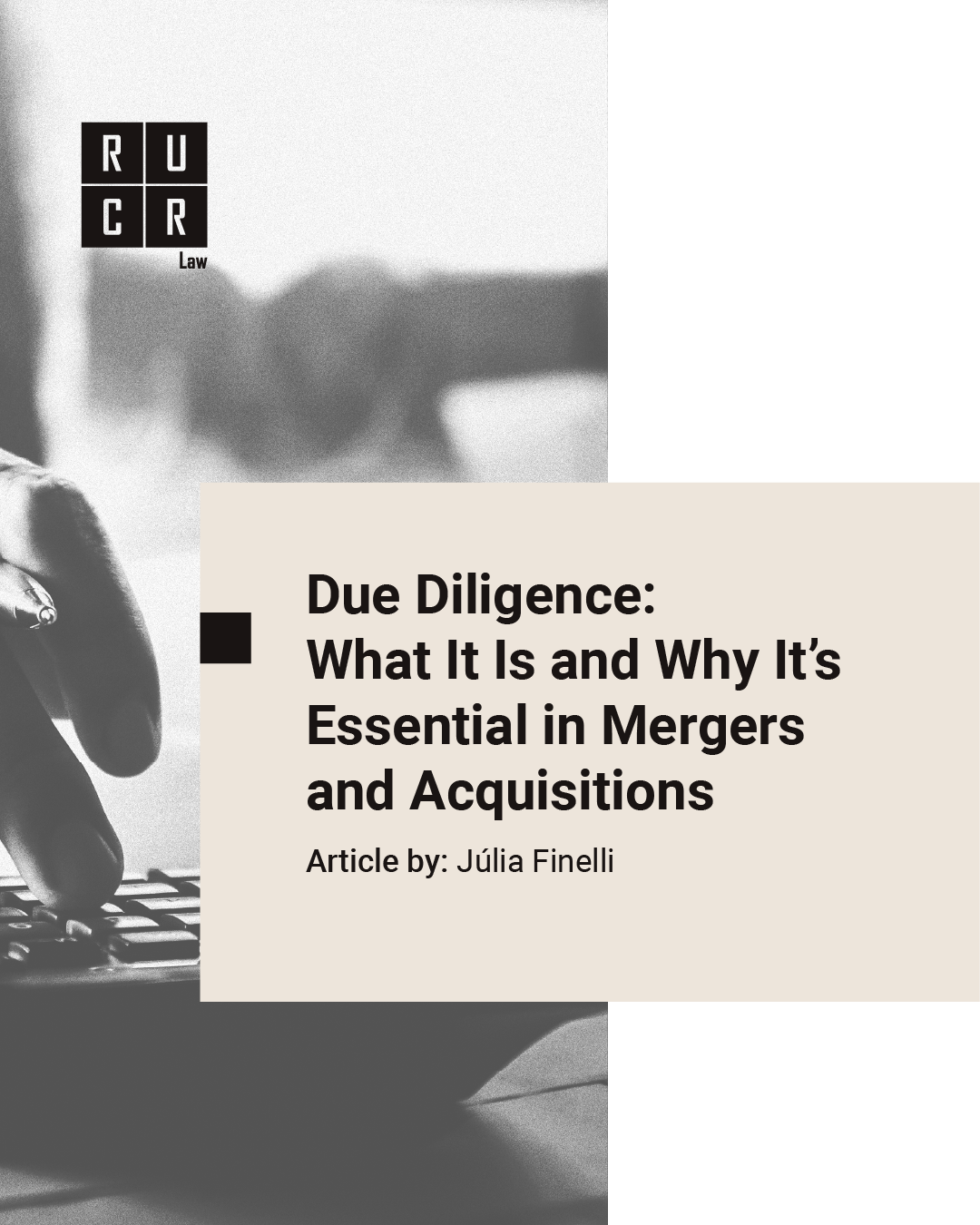
Due Diligence in Mergers and Acquisitions: What It Is and Why It Matters
When considering a new business or investment, the parties involved want to ensure that it will be efficient, transparent, and done with the least amount of risk possible.
In mergers and acquisitions (M&A), performing thorough Due Diligence, or Pre-Due Diligence, becomes essential for making accurate decisions and ensuring the success of the deal.
Due Diligence is a critical step in this process as it is an investigative procedure conducted by qualified professionals, aimed at gathering accurate and detailed information about the most important aspects of the other party involved, identifying risks, and helping set transaction values.
A well-conducted Due Diligence can uncover hidden risks that could drastically change the negotiation, alter the price, or even make the deal unfeasible. This analysis can be performed in different areas of a company, such as accounting, finance, operations, legal, and commercial.
From a legal perspective, Due Diligence helps identify and assess risks related to ongoing lawsuits, executions, liens, legal liabilities, especially in labor and tax matters, issues with contracts, or any other legal risks that could affect negotiations.
Performing this analysis makes decision-making safer. Due Diligence enables setting a fair price, establishing deal terms, and assessing feasibility by considering risks and the company’s reputation in the market, aiming to make the agreement beneficial for all parties involved.
Additionally, this analysis is important to ensure that all regulatory and legal obligations are met in the acquisition process.
In this context, it’s essential to use appropriate investigative tools to find potential compliance issues that could impact the future of the business or cause losses.
It’s vital that both parties involved in Due Diligence – the one providing the information and the one investigating it – are supported by experienced professionals.
On the part of the investigating company (the buyer in an M&A process), the advisory should help collect the required documentation from the seller and analyze it, identifying and calculating any risks. It should also maintain a dialogue with the selling party to ensure full clarity of the facts.
On the part of the selling company, which provides its information, the advisory is necessary to carry out proper and complete documentation collection and to engage with the other party, clarifying situations to avoid misunderstandings.
At RUCR Law, we have a system we call “Due Diligence Always Ready,” a tool for compiling documents and information that accelerates any Due Diligence process through prior document organization.
The partners of the companies involved in an M&A transaction must pay special attention to this step of the negotiation, as it is a critical part of the process.
At RUCR Law, we have a specialized team to handle all these matters, conducting Due Diligence in M&A transactions for both the selling and the buying parties.
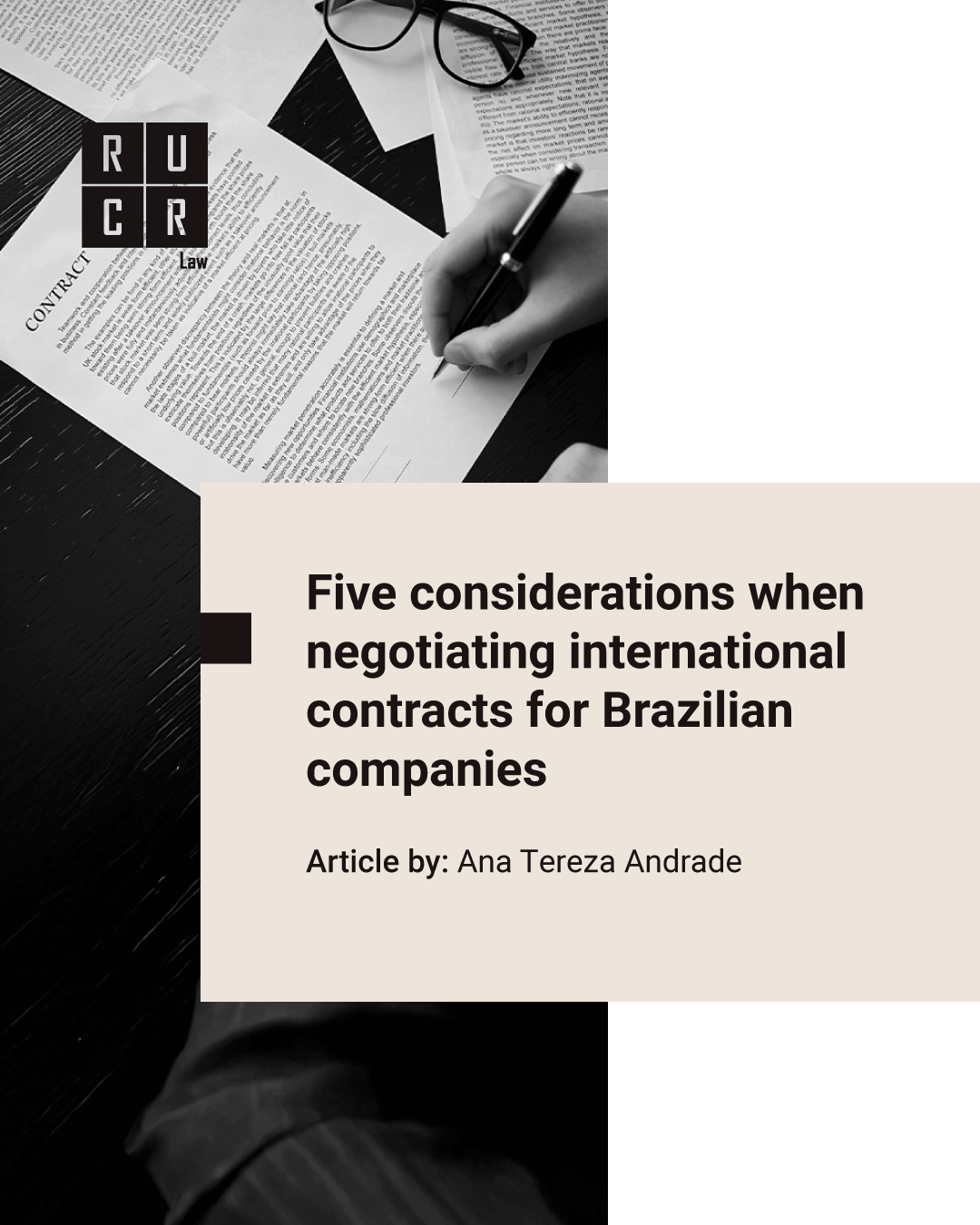
Five considerations when negotiating international contracts for Brazilian companies
Negotiating international contracts represents a significant challenge for Brazilian companies seeking to expand their businesses into foreign markets. In addition to facing the complexities of adapting to local regulations, companies must deal with cultural, financial, and operational issues, requiring a careful and strategic approach. With the growing globalization and the intensification of transnational transactions, contracting services, exporting and importing goods has become increasingly common, making it essential to ensure clarity and objectivity in contracts signed with foreign companies. This not only ensures the transparency of the agreement but also minimizes potential conflicts and preserves the rights of the Brazilian company.
Therefore, five essential points must be observed when negotiating international contracts for Brazilian companies:
1) Verifying the legitimacy of the foreign company: it is crucial to confirm the legal existence of the partner company, its correct formation, the representatives, and their negotiation powers. Without this verification, a signed contract may be invalid. Government agencies and local chambers of commerce can be valuable allies in this process.
2) Protection against exchange rate fluctuations: currency fluctuations can affect the viability of a contract, so it is important to consider legal and financial instruments to mitigate this risk, depending on the type of contract.
3) Contractual guarantees: due to the unpredictable nature of international markets, it is essential to include guarantee clauses, such as performance, reimbursement, or penalty clauses, to protect against financial and operational risks. Additionally, the method of enforcing these guarantees should be detailed in the contract.
4) Choice of contract execution location: determining where contractual obligations will be fulfilled directly impacts logistical, legal, and financial issues. Local legislation can influence contract interpretation and dispute resolution, making careful selection essential.
5) Progressive conflict resolution: a well-drafted international contract should provide for a graduated strategy for resolving conflicts, starting with negotiation, moving to mediation, and ultimately arbitration if necessary. This approach facilitates quick and less bureaucratic dispute resolution, which is crucial for transnational contracts.
Therefore, the careful negotiation and drafting of international contracts are crucial to avoid future litigation and misunderstandings regarding contract clauses, allowing the company to focus on its main objective: the development and growth of its business.
By: Ana Tereza Andrade
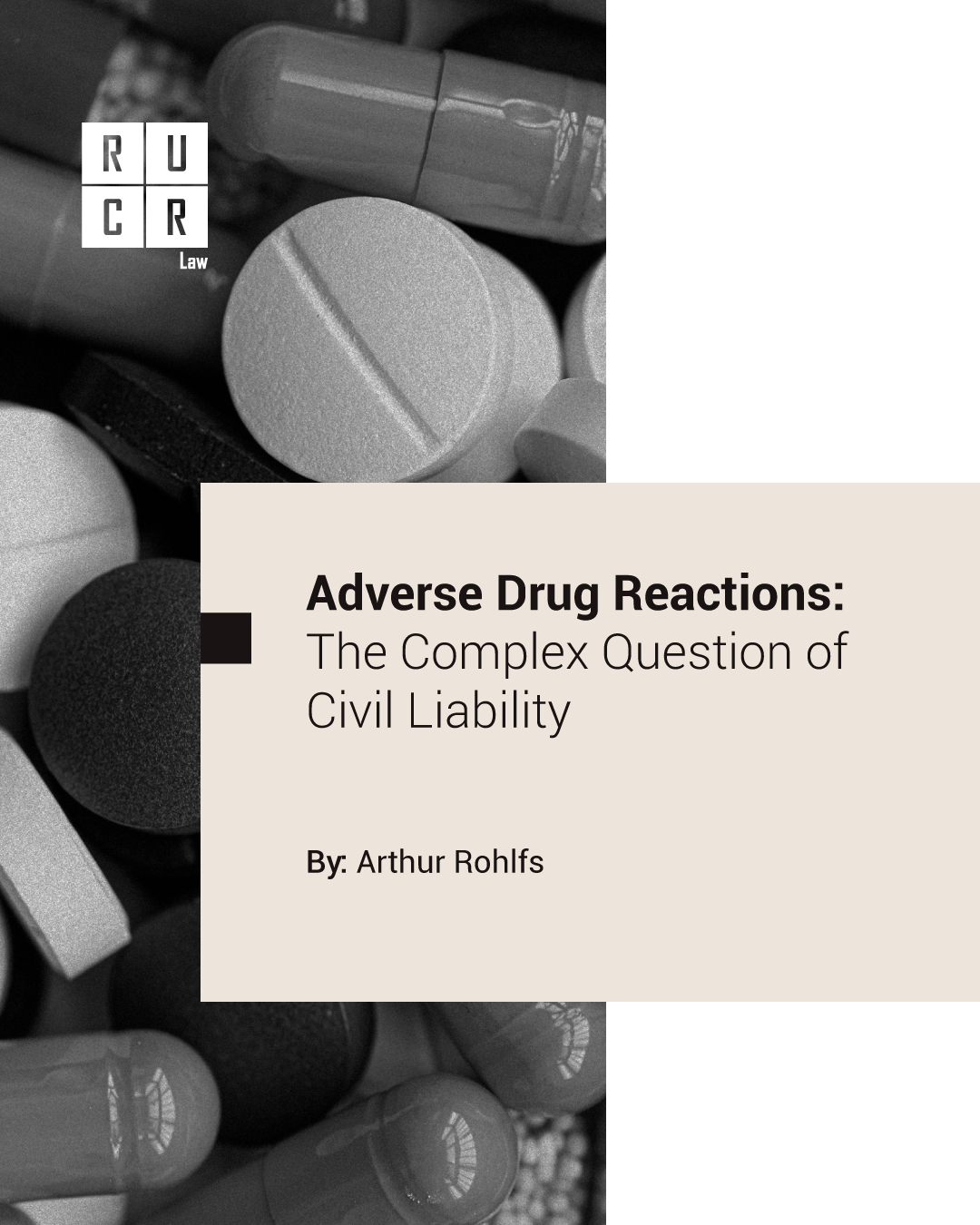
ARE PHARMACEUTICAL COMPANIES LIABLE FOR DAMAGES TO CONSUMERS CAUSED BY ADVERSE DRUG EFFECTS?
Civil liability of pharmaceutical companies for drug side effects is a highly controversial topic that often leads to debate in the Courts.
Analysing three precedents from the STJ (Superior Court of Justice) on the topic over the past seven years (REsp 1.599.405/SP, REsp 1.402.929/DF, and REsp 1.599.405/SP), a relatively safe pattern can be discerned regarding how the issue is perceived by our Higher Courts.
It appears that, as a rule, if the side effects are normal to the nature of the medicine and predictable to the consumer, the pharmaceutical company would be exempt from civil liability. Otherwise, there would be such liability.
According to the STJ, predictability would generally be assumed when there is sufficient information about this risk, which in practice occurs with its inclusion in the leaflet. In other words, it is understood that if it is listed in the leaflet, the pharmaceutical company could not be held liable because the consumer could foresee its occurrence.
However, this is one of the most relevant aspects for the Court: if it is not listed in the leaflet (because it was discovered later, for example), the pharmaceutical company must necessarily fulfil its duty to inform the consumer in other equally effective ways (warning to authorities, widespread advertisements, etc.). If it does not do this, the company would be civilly liable for consumer damages, because it is understood that the consumer’s right to choose was violated by not knowing about the risks. And this even if there could be a delay in the administrative request to update the leaflet with ANVISA.
On the other hand, even if it was not possible to foresee the occurrence of that side effect at the time the medicine was marketed (even due to scientific limitations), the pharmaceutical company would still be responsible if the consumer was not informed about the risk. This is a controversial point and still prompts several discussions, but it was the understanding adopted in a ruling by the 3rd Panel of the STJ (REsp 1.599.405/SP).
In any case, there is an important caveat: listing the side effect in the leaflet is not enough to it become predictable, as is often generalized. It is required that the adverse effect be considered normal, that is, it is not specific to a particular medicine, and that it does not raise doubts whether the product is defective in its formulation. In other words, a side effect is normal when it is equally seen in medicines of the same kind and when there is no concrete measure that can be taken by the pharmaceutical company to prevent or stop its occurrence.
Therefore, it is extremely important that pharmaceutical companies rigorously follow the drug development process. After all, it is during the clinical trial phases that these possible side effects can be investigated to enable not only the correction of the problem – when this is possible – but also, when it is not possible, to facilitate its prediction in the leaflet, so that the company can be safeguarded itself from potential liability.
Nevertheless, as there are positions that allow exceptions or even changes over the years, it is always important to have a qualified legal team to know how the Courts are addressing the matter. Only by having access to concrete, specific and current guidance can the risks involved in drug development be mitigated.
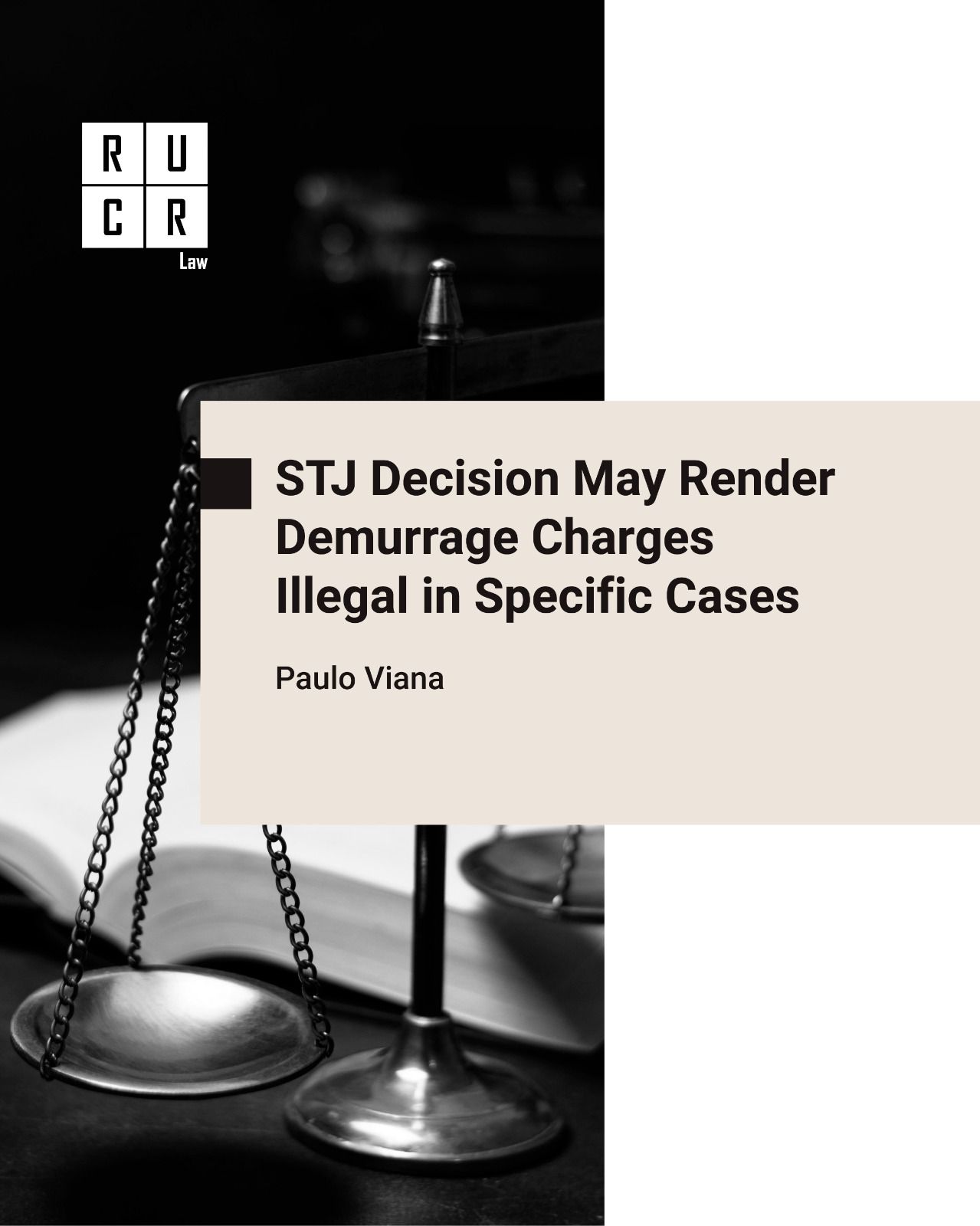
STJ Decision May Render Demurrage Charges Illegal in Specific Cases: Understand the Implications
This week, the Superior Court of Justice (STJ) of Brazil upheld a decision by the São Paulo Court of Justice, which deemed the imposition of demurrage charges illegal in cases of improper detention by customs authorities.
In general terms, demurrage is not a penalty clause but rather compensation for contractual non-compliance, aimed at compensating the container owners for potential losses incurred due to the undue retention of containers by the importer for a period exceeding the agreed timeframe. This liability arises irrespective of the importer’s fault in the delay, as long as the delay occurs.
However, in this recent ruling, it was determined that the undue retention and seizure of containers by the importer is no longer their responsibility, as it was caused by an administrative decision made by the Brazilian Customs. Consequently, the concept of “as long as the delay occurs” becomes less broad, as responsibility can now be attributed to another party, in this case, the Brazilian Customs.
This interpretation may positively impact importers, protecting them from being excessively harmed by abusive demurrage charges imposed by carriers and shipping companies in situations where importers were unable to return the containers within the stipulated period due to circumstances beyond their control.
https://www.linkedin.com/in/paulo-netto-viana/
